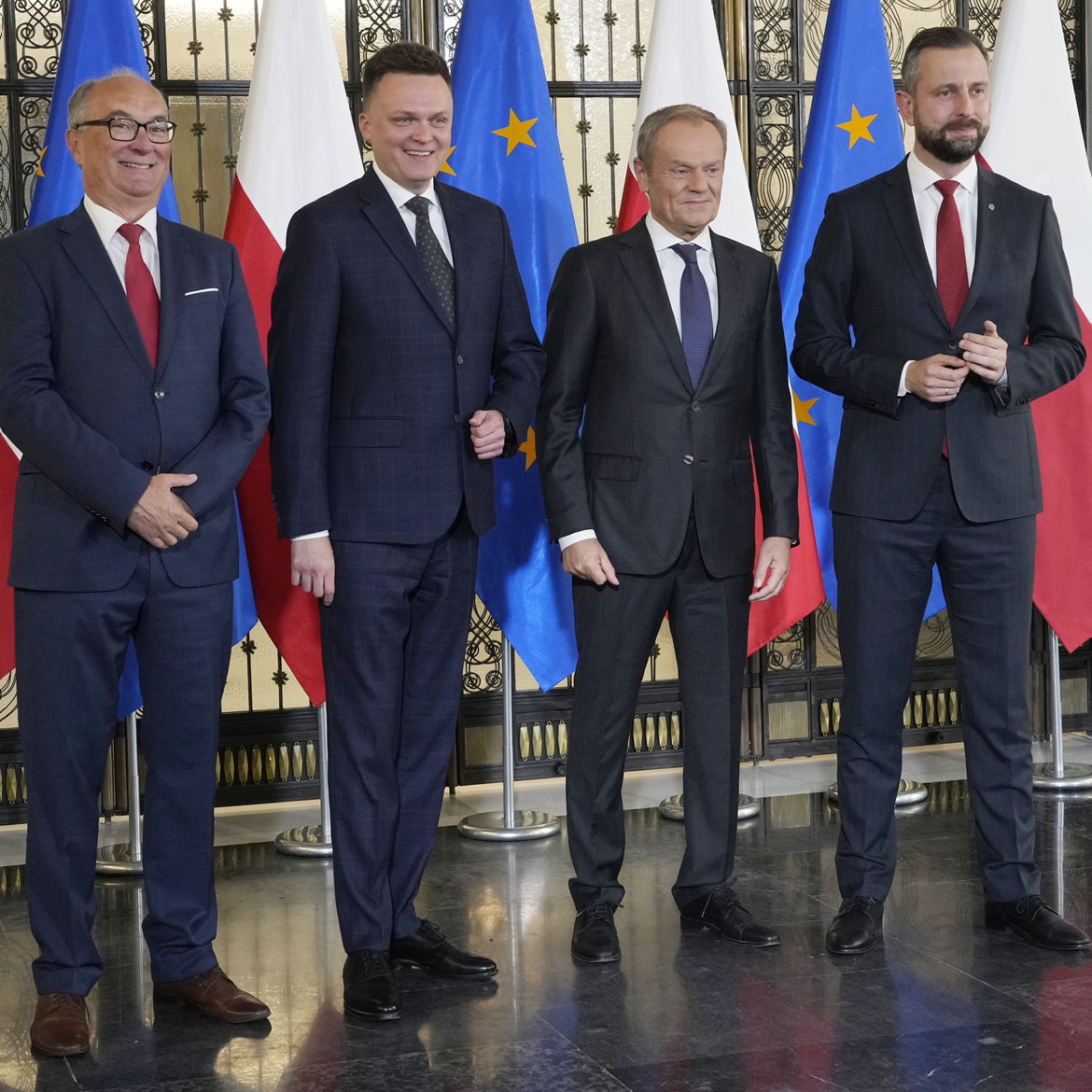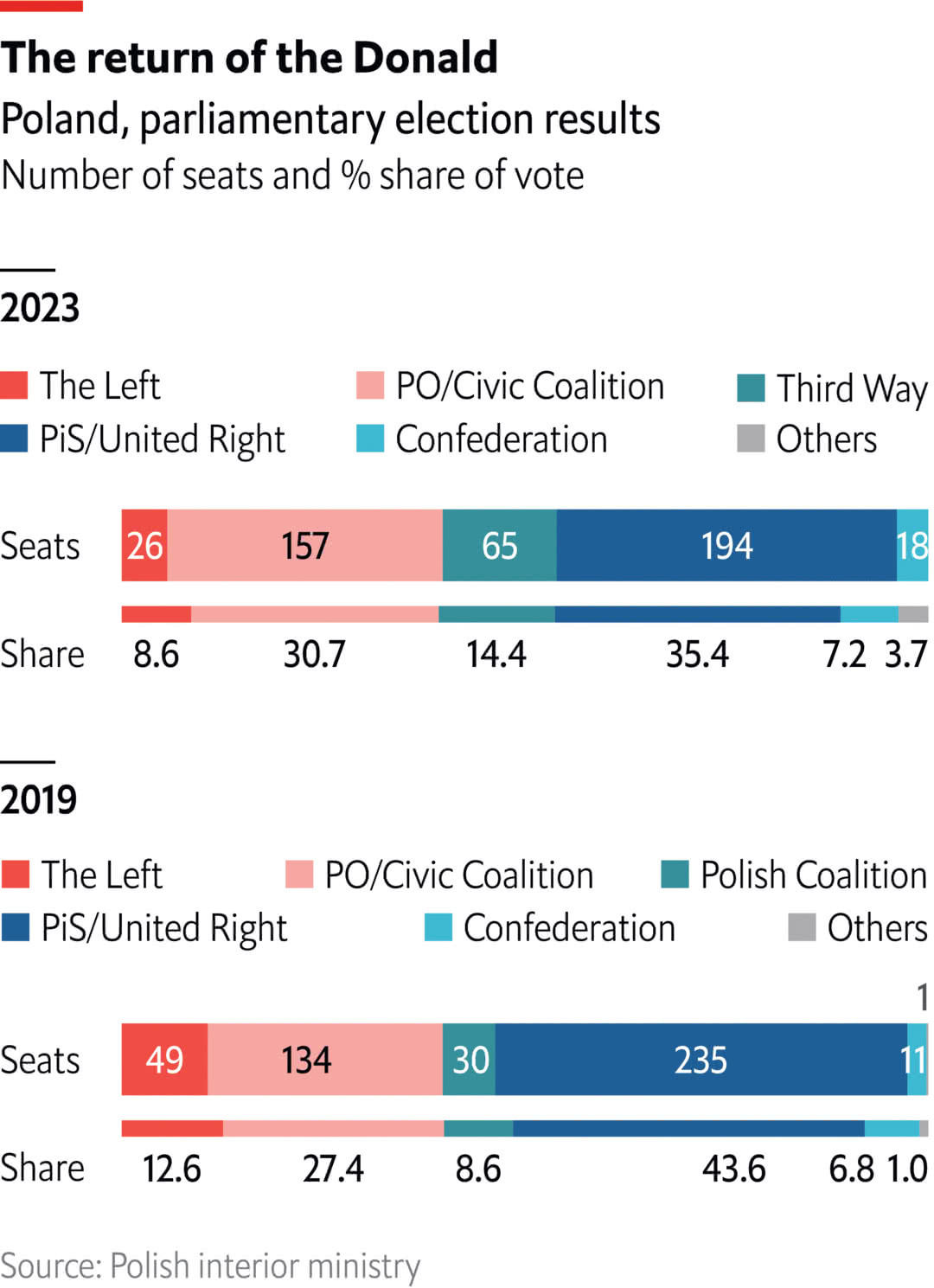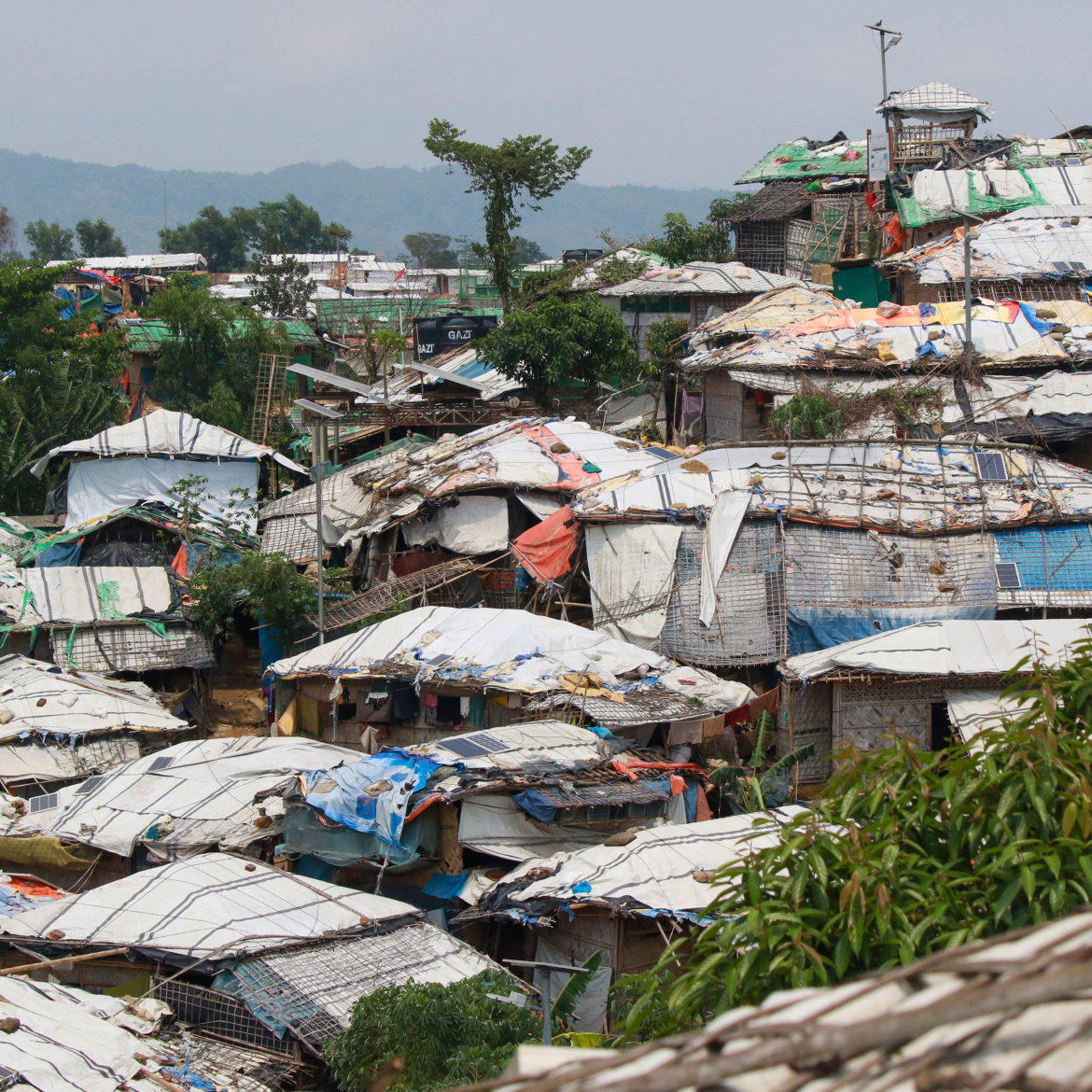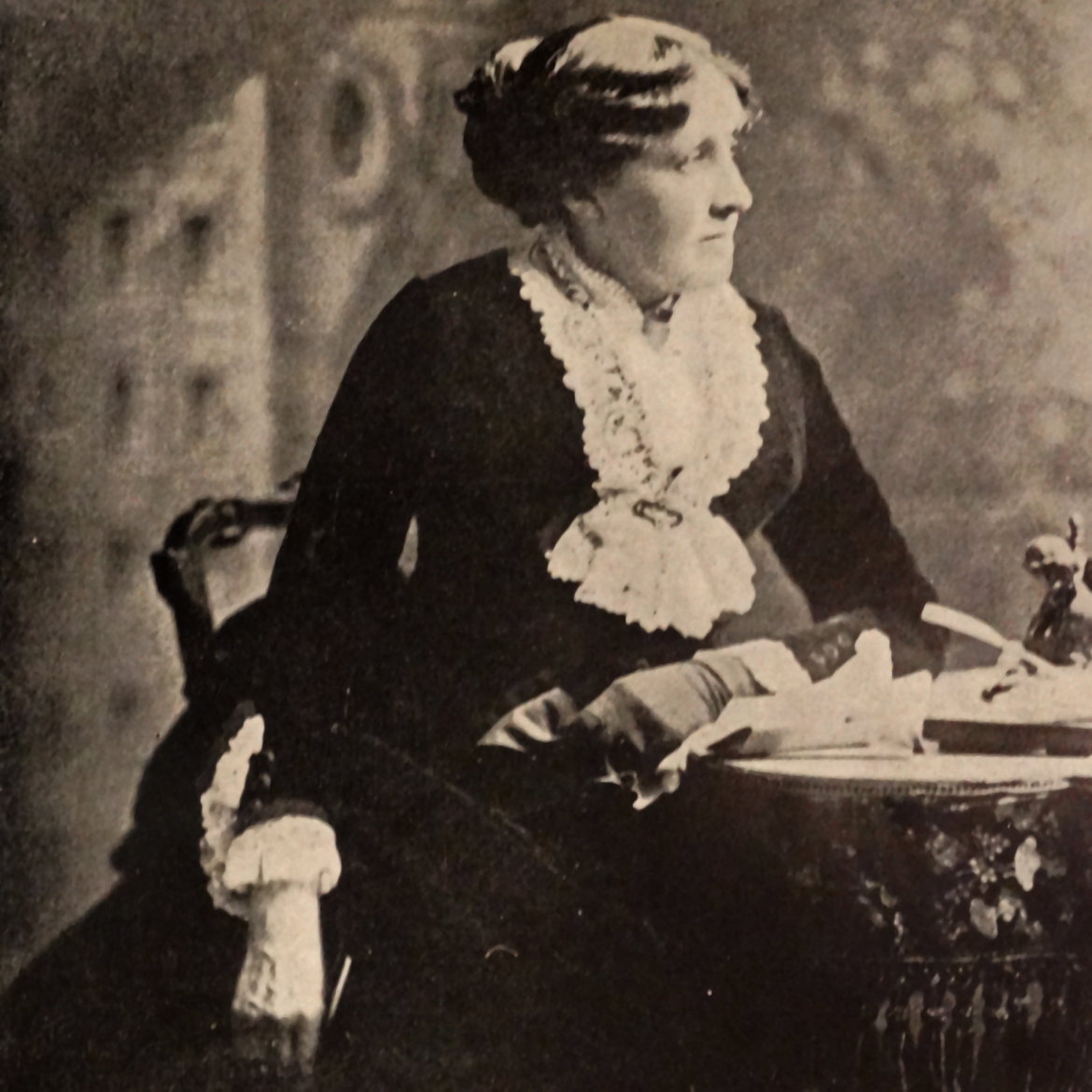The world in brief
Catch up quickly on the global stories that matter
After fighting was reported close to hospitals in Gaza the UN’s humanitarian aid chief, Martin Griffiths, called attacks on health-care facilities “unconscionable”. Israel’s government reportedly believes that the al-Shifa hospital, Gaza’s main hospital, is above Hamas tunnels, and that gaining control of it could weaken the organisation. But it denies having hit the hospital directly and says it will evacuate babies from the facility. The al-Shifa and al-Quds hospitals have both run out of fuel and are unable to provide some care.
Iran and Saudi Arabia called for an immediate ceasefire in Gaza. The regional rivals made the statement after Muhammad bin Salman, the de facto leader of Saudi Arabia, met Iran’s president, Ebrahim Raisi, for the first time since the countries restored diplomatic relations in March after a seven-year lapse. The pair, among dozens of leaders from the Islamic world, were at a summit in Riyadh, Saudi Arabia's capital.
Darfur, a region in Sudan is facing “another genocide”, warned the EU’s chief diplomat, Josep Borrell. Between 2003 and 2008 more than 300,000 people were killed in the region. According to Mr Borrell, in the past week 1,000 members of the Masalit, a black African ethnic group, have been killed by the Rapid Support Forces, a paramilitary force fighting the Sudanese army.
In Paris thousands of marchers protested against antisemitism. Incidents of abuse towards Jewish people have been on the rise in France since the start of the war between Israel and Hamas. Emmanuel Macron, the president, lamented the “unbearable resurgence of unbridled anti-Semitism” but did not join the rally. Marine Le Pen, a far-right leader, and two former presidents did attend.
America, Japan and South Korea agreed to share more data about North Korean missiles, during a meeting between their defence ministers. Lloyd Austin, Minoru Kihara and Shin Won-sik also condemned military co-operation between North Korea and Russia, whose leaders, Kim Jong-Un and Vladimir Putin, met in September. The regimes are believed to have exchanged weapons and weapons technology.
Ukraine has enough energy resources to get it through the winter, according to the country’s energy minister. But German Galushchenko warned that services could be disrupted by further attacks by Russia on Ukraine’s energy infrastructure. Last winter blackouts lasted for weeks. Winter is rapidly approaching in Ukraine, with temperatures expected to fall rapidly next week.
Pope Francis sacked Bishop Joseph Strickland, a conservative from Texas, who is known for criticising the Vatican on social media. Among other complaints Bishop Strickland objects to the Pope’s plans to make the Catholic church more welcoming to gay people. He was asked to resign on November 9th, but he refused, so Pope Francis took the highly unusual step of firing him.
Figure of the day: 73m, the number of people who have watched “The Crown”, a royally expensive royal drama. Read the full story.

The battle for al-Shifa hospital
Outside al-Shifa hospital a battle rages: Israeli troops are fighting Hamas, the militant group that controls Gaza. Inside the hospital, Gaza’s largest, are thousands of wounded and displaced people. Medics say that they have run out of fuel to operate their generators. The Israeli army accuses Hamas of putting its headquarters in a web of tunnels underneath the hospital. It has advanced to within a few hundred metres of the facility.
The Israeli government has not yet given the order for troops to enter it. That is partly because it hopes to negotiate a deal to free some of the roughly 240 hostages held in Gaza by Hamas and other militant groups. Talks are ongoing in Qatar and Egypt. Whether they succeed or not, though, Israeli troops will probably enter al-Shifa in the coming days. Other hospitals in Gaza have already had to evacuate after running out of fuel and coming under fire.

Inflation eases in India
Indians celebrated the festival of Diwali on Sunday by lighting fireworks and exchanging presents. But the country's central bankers are hoping to receive their gift on Monday. That is when inflation data for October will be released. Economists believe that consumer-price growth will fall to 4.8% year on year, down from 5% in September. The fourth consecutive monthly decline would bring inflation closer to the Reserve Bank of India's target of 4%.
The figures will be vindication for Shaktikanta Das, the RBI’s governor, who resisted raising interest rates even as the inflation rate jumped to more than 7% in July. That spike, he insisted, was temporary because it was caused by an erratic monsoon season, which disrupted food production. Slowing inflation would also be a gift for India's prime minister, Narendra Modi. His Bharatiya Janata Party is competing in five state elections this month in which nearly a sixth of the Indian electorate will vote. Easing prices, especially for food, could improve its chances.

Poland’s parliament regroups
On Monday MPs will fill the 460 seats in Poland’s parliament for the first time since an election in October. There will be 117 fresh faces. But the main change is that, after eight years of rule, the Law and Justice (PiS) party no longer commands a majority in the Sejm, the more powerful lower house.
In calling the first parliamentary session, Poland’s president, Andrzej Duda, said he would give the largest party’s candidate to be prime minister—in this case, Mateusz Morawiecki, the current PiS prime minister—a first go at forming a government. Mr Morawiecki is almost certain to fail. The opposition, which plans to rule in a sprawling coalition, has a majority in parliament. On November 10th its leaders signed a formal agreement. But PiS is playing for time. A few extra weeks in power could allow it to entrench more cronies and sign long-term contracts in both public institutions and state-owned companies.


Rohingya rights in Bangladesh
On Monday a panel from the UN Human Rights Council will discuss its latest report on human rights in Bangladesh and assess conditions there. Its conclusions will not be favourable.
Since 2017 nearly 1m Rohingyas, a Muslim people from Rakhine state in majority-Buddhist Myanmar, have sought refuge in Bangladesh. They have fled persecution so brutal that the UN has deemed it to be a genocide. Myanmar’s government, which claims that the Rohingya are immigrants, gives them no rights. Their rights are also restricted in refugee camps in Bangladesh. Rohingya are confined to the camps by barbed-wire fences, a practice that violates international law. Police-enabled gang violence is rampant.
The UN report is unlikely to spur Bangladesh to improve conditions. According to Bangladesh’s government, China is trying to help it move 3,000 Rohingya back to Myanmar. Fortify Rights, a human-rights watchdog, calls the plan “premature and dangerous”. Whether in Bangladesh or Myanmar, the Rohingyas’ future is bleak.

The many lives of Louisa May Alcott
Before publishing “Little Women” in 1869, Louisa May Alcott used various pseudonyms to experiment with different writing styles. There was A.M. Barnard for thrillers, Flora Fairfield for poetry and the delightful Tribulation Periwinkle for letters. Max Chapnick, an academic at Northeastern University in Boston, believes he has found more aliases.
Mr Chapnick says that Alcott may have penned seven stories, five poems and one piece of non-fiction under the names E. Gould and I.H. Gould. The discovery was the result of literary detective work. Mr Chapnick cross-referenced a list of lost stories by Alcott with pieces published by her favoured outlets. The Goulds’ work has stylistic similarities to Alcott’s. Two pieces feature characters named Alcott and one mentions a house she once lived in.
If Mr Chapnick is correct, his finding will deepen readers’ understanding of Alcott’s oeuvre. He describes one of the stories, “The Phantom”, as a feminist take on Charles Dickens’s “A Christmas Carol”.

Daily quiz
We will serve you a new question each day this week. On Friday your challenge is to give us all five answers and, as important, tell us the connecting theme. Email your responses (and include mention of your home city and country) by 1700 GMT on Friday to [email protected]. We’ll pick randomly from those with the right answers and crown three winners on Saturday.
Monday: Which colour did Roman emperors ban their subjects from wearing and is often associated with monarchies?
In difficult times, fashion is always outrageous.
Elsa Schiaparelli